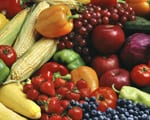The Atlantic has covered research carried out in the fruit fly lab of SMU biologist Johannes H. Bauer by Plano, Texas, high school student Ria Chhabra in its March 27, 2013, article “Eating Organic Food Associated With Longer Lives (in Flies).”
Bauer, an assistant professor in SMU’s Department of Biological Sciences, mentored Chhabra in her research to examine whether there would be health differences to fruit flies fed an organic diet or a nonorganic diet. Chhabra’s study found that flies fed an organic diet fared better on important health tests, particularly fertility and longevity.
EXCERPT:
Lindsay Abrams
The Atlantic
Fruit flies fed organic produce from Whole Foods lived longer and laid more eggs than those fed the store’s conventionally grown offerings.PROBLEM: Last September when Stanford researchers came out with findings that organic food doesn’t confer any additional nutritional value, the world countered: Of course not. While organic fruits and vegetables can claim health benefits in that they lack any number of additives that come included with traditionally farmed foods, calling produce organic doesn’t make it any healthier than it already, by virtue of being a fruit or vegetable, is supposed to be.
Still, that doesn’t mean researchers can’t turn it around and ask if produce containing chemicals, preservatives, and hormones are, comparatively, a little bit less healthy. While we know organic food serves the interests of the environment, public health, and human rights, there’s a lot we still don’t know about its benefits for the individual supermarket shopper deciding between the banana with the “organic” sticker and the one that’s heaped in with the other, conventional foods.
METHODS: At Southern Methodist University, researchers raised fruit flies on extracts of typical grocery store produce. Different groups of flies received either organic or conventional versions of potatoes, soybeans, raisins, or bananas, all purchased from the same Texas Whole Foods.
RESULTS: Despite the relatively poor health exhibited by all — as happens when one lives its entire life consuming only one type of food — the flies who ate organic generally performed better on a number of health measures.
Specifically, diets of organic potatoes, raisins, and soy were all associated with significantly longer lifespans, with no difference seen between organic and conventional bananas. Flies raised on organic versions of all four foods were more fertile.
Follow SMUResearch.com on Twitter.
For more information, www.smuresearch.com.
SMU is a nationally ranked private university in Dallas founded 100 years ago. Today, SMU enrolls nearly 11,000 students who benefit from the academic opportunities and international reach of seven degree-granting schools. For more information see www.smu.edu.
SMU has an uplink facility located on campus for live TV, radio, or online interviews. To speak with an SMU expert or book an SMU guest in the studio, call SMU News & Communications at 214-768-7650.



 Fruit flies fed organic diets are healthier than flies fed nonorganic diets, study finds
Fruit flies fed organic diets are healthier than flies fed nonorganic diets, study finds Center for Creative Leadership to study innovative learning method of SMU Lyle School of Engineering
Center for Creative Leadership to study innovative learning method of SMU Lyle School of Engineering Parenting program tackles child abuse and neglect among formerly homeless families
Parenting program tackles child abuse and neglect among formerly homeless families Hiding in plain sight: How invisibility saved New Mexico’s Jicarilla Apache
Hiding in plain sight: How invisibility saved New Mexico’s Jicarilla Apache